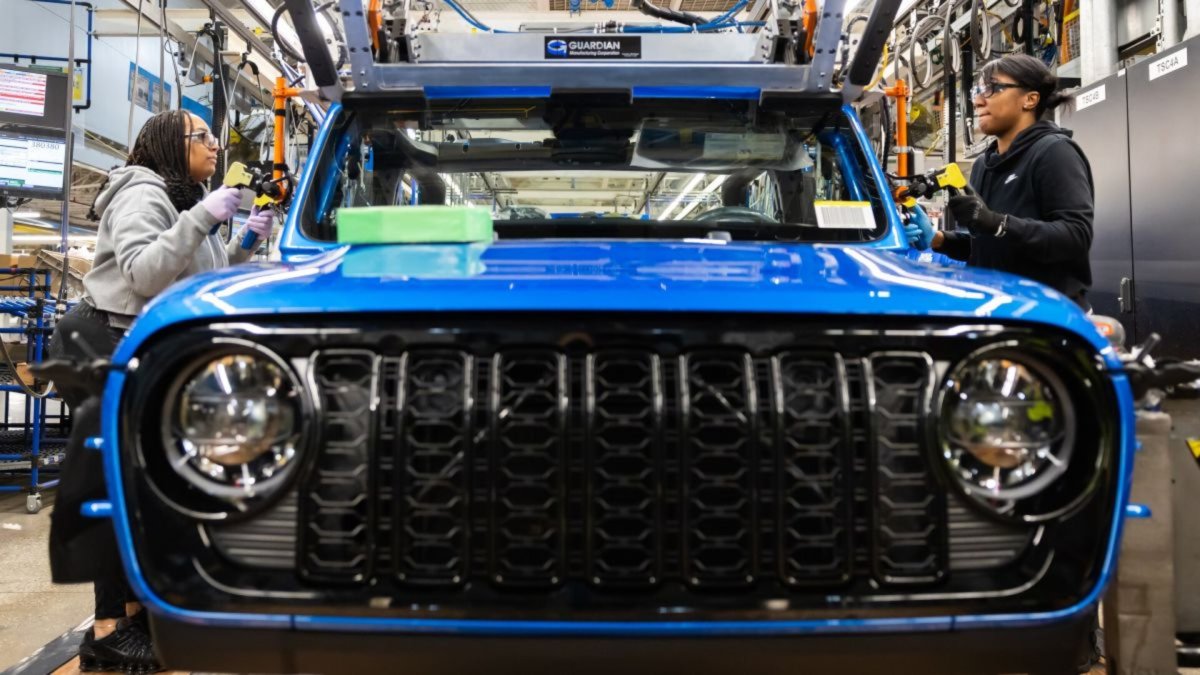[ad_1]
The U.S. auto industry has had a seat at the table from the beginning, so when President Donald Trump announced 25% tariffs on auto imports, it didn’t take the big players by surprise.
The U.S. auto industry, consisting of General Motors, Ford, and French conglomerate Stellantis — collectively known as the Detroit Big 3 — each praised the move at the time.
“For decades now, it has not been a level playing field for us automakers globally, with either tariffs or non-tariff trade barriers. So I think tariffs is one tool that the administration can use to level the playing field,” GM CEO Mary Barra said.
Related: New Stellantis CEO deals with more of the company’s old problems
Barra has also stated that “leveling the playing field,” as she put it, will wipe out between $4 billion and $5 billion in EBITDA this year.
Ford has also praised the tariffs, with company execs saying it “supports the administration’s goal to strengthen the U.S. economy by growing manufacturing.”
The reason for the support is that Ford makes more cars in America than anyone else.
“Last year, we assembled over 300,000 more vehicles in the U.S. than our closest competitor. That includes 100% of all our full-size trucks,” CEO Jim Farley said during the company’s last earnings call.
“In this new environment…automakers with the largest U.S. footprint will have a big advantage, and boy, is that true for Ford,” he added. “It puts us in the pole position.”
Despite that advantage, Ford estimates tariffs will shave at least $1.5 billion off the company’s EBITDA this year.

Image source: Stellantis
Stellantis puts a $2.7 billion price tag on its tariff misery
Stellantis has also spoken glowingly of President Trump’s tariffs, but the company at the same time warned that the taxes present it with a major headwind.
Stellantis — which owns Dodge, Jeep, Ram, and Chrysler — imported 564,000 vehicles last year, well ahead of Ford’s 420,000 imports. Both imported fewer vehicles than GM, which imported 750,000 vehicles last year.
“With the new automotive sector tariffs now in effect, it will take our collective resilience and discipline to push through this challenging time,” new Stellantis CEO Antonio Filosa said recently.
On Monday, the company detailed precisely how challenging the tariffs have been when it released preliminary first-half sales figures.
Stellantis expects a net loss of 2.3 billion euros ($2.68 billion) in the first half of the year due to pre-tax net charges and the early effects of U.S. tariffs.
Related: Jeep Dodge parent Stellantis makes change US consumers will love
While the $2.7 billion figure includes charges for many different issues, Stellantis specifically charged 300 million euros ($350 million) to the tariff game in the first half of the year.
Second-quarter shipments fell 6% to 1.4 million vehicles globally, while North American shipments are expected to decline by 109,000 units, a 25% annual decline, due to reduced manufacturing and shipments of imported vehicles.
Net revenue in the first half fell to 74.3 billion euros from 85 billion last year (to $86.65 billion from $99.13 billion).
More Automotive news:
- 1 in 5 new car shoppers are committing a big financial blunder
- Tesla’s newest Robotaxi rival has experience and deep pockets
- Ford’s $570 million mistake hits one of its most popular models
Stellantis (STLA) shares were down 1.7% to $9.04 per share at last check in early market trading Monday.
Stellantis recommits to North America under new CEO Antonio Filosa
Former Stellantis CEO Carlos Tavares left the company in late 2024, and new CEO Antonio Filosa started his tenure on Monday, June 23.
Stellantis’ choosing Filosa was an early signal that the U.S. market was one of the company’s priorities, as he cut his teeth as head of the North American market.
Under former CEO Carlos Tavares’ leadership, Stellantis laid off American factory workers, shuffled its C-suite, and forced its U.S. brands to push products that American customers didn’t like.
Meanwhile, Filosa announced he would keep his title as director of North America as he moved the CEO’s office to Detroit, Michigan.
Stellantis revealed in May that it will build a $388 million “megahub” in Van Buren Township, just outside Detroit.
When the facility is completed in 2027, it “will feature cutting-edge technology” and will probably look more like an Amazon fulfillment warehouse than a typical auto parts distribution center.
Related: Jeep, Dodge parent Stellantis doubles down on the US
[ad_2]